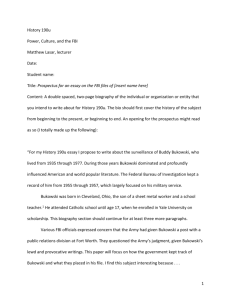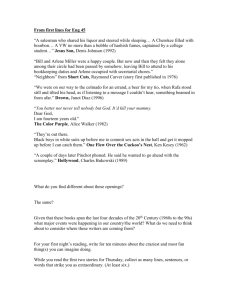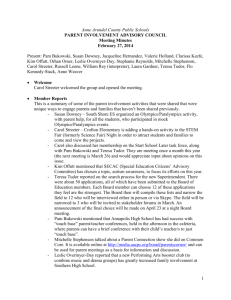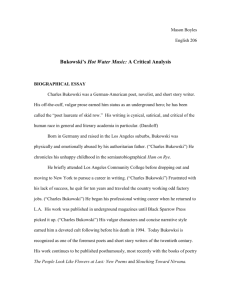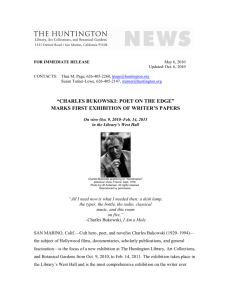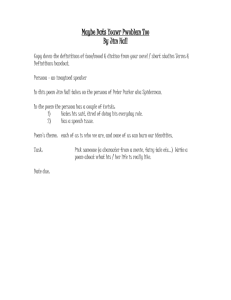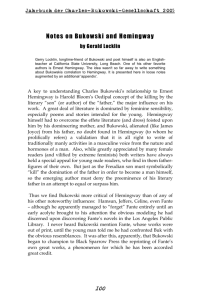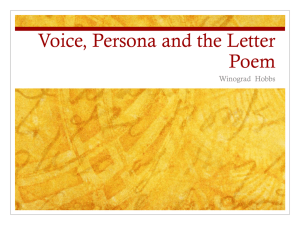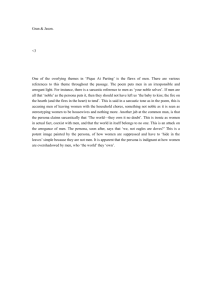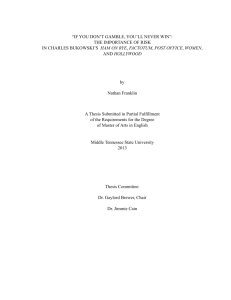Notes on The Bukowski
advertisement
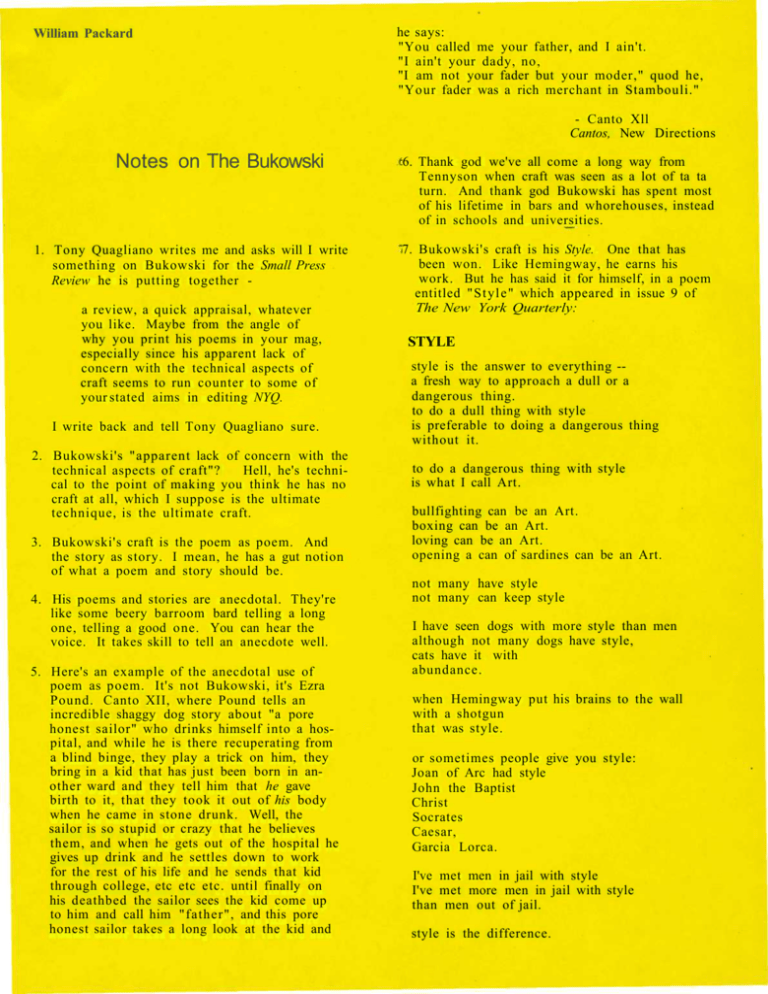
William Packard he says: "You called me your father, and I ain't. "I ain't your dady, no, "I am not your fader but your moder," quod he, "Your fader was a rich merchant in Stambouli." - Canto Xll Cantos, New Directions Notes on The Bukowski 1. Tony Quagliano writes me and asks will I write something on Bukowski for the Small Press Review he is putting together a review, a quick appraisal, whatever you like. Maybe from the angle of why you print his poems in your mag, especially since his apparent lack of concern with the technical aspects of craft seems to run counter to some of your stated aims in editing NYQ. I write back and tell Tony Quagliano sure. 2. Bukowski's "apparent lack of concern with the technical aspects of craft"? Hell, he's technical to the point of making you think he has no craft at all, which I suppose is the ultimate technique, is the ultimate craft. 3. Bukowski's craft is the poem as poem. And the story as story. I mean, he has a gut notion of what a poem and story should be. 4. His poems and stories are anecdotal. They're like some beery barroom bard telling a long one, telling a good one. You can hear the voice. It takes skill to tell an anecdote well. 5. Here's an example of the anecdotal use of poem as poem. It's not Bukowski, it's Ezra Pound. Canto XII, where Pound tells an incredible shaggy dog story about "a pore honest sailor" who drinks himself into a hospital, and while he is there recuperating from a blind binge, they play a trick on him, they bring in a kid that has just been born in another ward and they tell him that he gave birth to it, that they took it out of his body when he came in stone drunk. Well, the sailor is so stupid or crazy that he believes them, and when he gets out of the hospital he gives up drink and he settles down to work for the rest of his life and he sends that kid through college, etc etc etc. until finally on his deathbed the sailor sees the kid come up to him and call him "father", and this pore honest sailor takes a long look at the kid and 6. Thank god we've all come a long way from Tennyson when craft was seen as a lot of ta ta turn. And thank god Bukowski has spent most of his lifetime in bars and whorehouses, instead of in schools and universities. 7. Bukowski's craft is his Style. One that has been won. Like Hemingway, he earns his work. But he has said it for himself, in a poem entitled " S t y l e " which appeared in issue 9 of The New York Quarterly: STYLE style is the answer to everything -a fresh way to approach a dull or a dangerous thing. to do a dull thing with style is preferable to doing a dangerous thing without it. to do a dangerous thing with style is what I call Art. bullfighting can be an Art. boxing can be an Art. loving can be an Art. opening a can of sardines can be an Art. not many have style not many can keep style I have seen dogs with more style than men although not many dogs have style, cats have it with abundance. when Hemingway put his brains to the wall with a shotgun that was style. or sometimes people give you style: Joan of Arc had style John the Baptist Christ Socrates Caesar, Garcia Lorca. I've met men in jail with style I've met more men in jail with style than men out of jail. style is the difference. a way of doing, a way of being done. 6 heron standing quietly in a pool of water or you walking out of the bathroom naked without seeing me. - issue 9 (winter 1972) The New York Quarterly The whole poem is a good demonstration of Bukowski's style. How it moves from general statement to the stunning specifics of the last 4 lines. 8. Here's another example of the Bukowski style in action, not in a poem but in a short story. He is describing a job he had once in a meat packing plant: then several of the Black Muslims came running up with wheel-barrows painted a scabby and lumpy white, like white was mixed in white henshit. and each wheel-barrow was loaded with mounds of hams that floated in a thin and watery blood, no, they didn't float in the blood, they sat in it, like lead, like cannonballs, like death. one of the boys jumped into the truck behind me and the other began throwing the hams at me and I caught them and threw them to the guy behind me who turned and threw the ham into the back of the truck, the hams came fast FAST and they were heavy and they got heavier. as soon as I threw one ham and turned another was already on the way to me through the air. I knew that they were trying to break me. I was soon sweating as if faucets had been turned loose and my back ached, my wrists ached, my arms hurt. everything hurt and was down to the last impossible ounce of limp energy. I could barely see. barely summon myself to catch one more ham and throw it, one more ham and throw it. I was splashed in blood and kept getting the soft dead heavy FLUMP in my hands, the ham giving a little like a woman's butt, and I' m too weak to talk and say, hey, what the HELL'S the matter with you guys? the hams are coming and I am spinning, nailed, like a man on a cross under a tin helmet. and they are all empty, and I stand there swaying and breathing the yellow electric lights. it was a night in hell, well, I always liked night work. - "Kid Stardust on the Porterhouse" Erections, Ejaculations. Exhibitions and General Tales of Ordinary Madness City Lights The reader can see for himself what crazy things are working in this passage............ Action and life. If he can't see for himself, he ought to go back and reread............ If he still can't see it, no amount of explaining will help much. 9. I must admit there's one style problem I had with Bukowski's work. There seems to be a characteristic abatement at the end of any story or poem, like a shrugging off of the piece at the very end. It's sort of who-givesa-fuck-anyway gesture that feels like a throwaway. At first I thought this was a defect, an unwillingness in Bukowski to go ahead and finish the job, realise whatever it was he was developing in the story or poem. Then I realised that this was a necessary settling of the voice of the poem, a return to the Persona. So maybe I ought to talk about his Persona. 10. Bukowski's Persona is himself, it's as if he uses himself like a piece of litmus paper which is reacting all over the place to some chemical situation. As writer, he lets us in on an experience, all the while he holds himself there in the experience for us to check out his own reaction to the experience. This is not the same thing as seeing something through the writer's own eyes. With Bukowski. the writer's eyes are on the experience and also on himself in the act of the experience, both at the same time. Which makes for an eerie sort of lucidity. At times it can be downright frightening. Most of the time it works as a remarkable sanity. 11. I mentioned Hemingway. I think a couple of Bukowski's stories are as good - taut and real and unnerving - as any of Hemingway's. For example, "All the Pussy We want" I'd place on the same plane as "The Killers" Other Bukowski stories show he has learned a lot from Hemingway Read over the first page of "The White Beard" and see how well he introduces the action of the story as casually and as economically as Hemingway does in most of his stories. 12. Persona. Bukowski wrote a column for Open Citv called "Notes of A Dirty Old Man". Bukowski's Persona is this dirty old man watching himself go through experiences, acting and being acted upon. This Bukowski Persona has a lot in common with the Persona which W. C. Fields used to use in his comedy routines. But the dirty old man " m a s k " could just as easily be the bad little boy mask, or the Milton Satan mask who "durst defy the Omnipotent in arms", or a Camus anti hero who rebels, curses, rants and gives god the finger. There's a lot of the heroic Job in Bukowski's barroom tables. Job who picks at his boils and sits there bitching at the way things are set up. 13. Here's one description of the Persona, in the open;ng of one of Bukowski's best stories, "The Fiend": Martin Blanchard had married twice, divorced twice, shacked up many times. Now he was forty-five, lived alone on the fourth floor of an apartment house and had just lost his twentyseventh job through absenteeism and disinterest. He was living on his unemployment checks. His desires were simple - he liked to get drunk as much as possible, alone, and he liked to sleep long hours and stay in his apartment, alone. Another odd thing about Martin Blanchard was that he was never lonely. The longer he could remain separated from the human race, the better he felt. The marriages, the shackjobs, the one-night stands had made him feel that the sex act was not worth what the female demanded in return. Now he lived without the female and masturbated frequently. - "The Fiend" Ibid 14. Behind this Persona is a hell of a lot of boredom with the ordinary goals which have been set up by our society. This is what makes the Bukowski Persona interesting as metaphor for our own lives. "sorry, now, here, do you like overtime on a job?" " o h , yes! I would like to work 7 days a week if possible, and 2 jobs if possible." "why?" " m o n e y , sir. money for a color tv. new autos, down payment on a home, silk pajamas, 2 dogs, an electric shave, life insurance, medical insurance, oh all kinds of insurance and college educations for my children if I have children and automatic doors on the garage and fine clothes and 45 dollar shoes, and cameras, wrist watches, rings, washers, refrigerators, new chairs, new beds, wall-to-wall carpeting, donations to the church, thermostat heating and . . . " "all right, stop, now when are you going to use all this stuff?" "I don't understand, sir." "I mean, when you are working night and day and overtime, when are you going to enjoy these luxuries?" " o h , there'll be a day, there'll be a day, sir!" "and you don't think your kids will grow up some day and just think of you as an asshole?" "after I've worked my fingers to the bone for them, sir! of course n o t ! " - "The Gut-Wringing Machine" Ibid 15. Persona. Beckett or Bukowski. They're playing different kinds of Endgame. Samuel Beckett in Waiting For Godot and Krcpp' s Last Tape and Happy Days, presents us with characters who are at war with the futility of ex- istence, on the brink of emptiness, vomiting out the void which is inside of them, talking to nothingness about nothingness, suffocating in the silence of their iives, pestered by their own impotence, and confronting impossibility with eve ry gesture and syllable. Bukowski's Endgame is a game of getting as many ends together as possible, his characters waste their lives chasing after each other's orifices, -fucking, farting, jerking off getting drunk, being broke, loafing around, getting picked up by cops, being beaten, betting on horses, spitting blood, and cruising for whores. They're also at war with the futility of existence, and Bukowski's sex is no more redemptive than Beckett's impotence is, in fact it's just as despe rate and sterile. But Bukowski's characters do seem to get one hell of a bang out of a good lay. Count your blessings. 16. Beckett's Nihilism versus Bukowski's Resignation, Samuel Beckett is not strictly a nihilist, he does propose the " m a y b e " and the "perhaps". He takes Kierkegaard's "either/or" and makes it into "and/also". Beckett can be exasperating in his refusal to make an out &. out rejection of faith, based on the grim hope that there may be something somewhere that could turn up and work out. We can't close all our options. Bukowski though has slammed the door on almost all experience outside his own carefully prescribed area of whores, horses, and booze. His apologia for this wholesale rejection is pretty persuasive: are there good guys and bad guys? some that always lie. some that never lie? are there good and bad governments? no, there are only bad governments and worse governments. will there be the flash of light and heat that rips us apart one night while we are screwing or crapping or reading the comic strips or pasting blue-chip stamps into a book? instant death is nothing new, nor is mass instant death new. but we've improved the product; we've had these centuries of knowledge and culture and discovery to work with; the libraries are fat and crawling and overcrowded with books; great paintings sell for hundreds of thousands of dollars; medical science is transplanting the human heart; you can't tell a madman from a sane one upon the streets, and suddenly we find our lives, again, in the hands of the idiots. the bombs may never drop; the bombs might dro p. eeney, meeney, miney, mo now if vou'll forgive me. dear readers, I'll get back to the whores and the horses and the booze, while there's time. If these contain death, then to me. it seems far less offensive to be responsible for your own death than the other kind which is brought to you fringed with phrases of Freedom and Democracy and Humanity and/or any or all of the Bullshit. first post, 12:30. first drink, now. and the whores will always be around. Claire. Penny, Alice, Jo . . . eeney, meeney, miney, mo . . . "Politics is Like Trying to Screw a Cat in the Ass" Ibid 1 7 Bukowski's Persona hits close to home for us. Our own animal manners are too repulsive to us in our own solitude. Bukowski owns up to them, all the farts and pimples. For laughs, you might compare this Persona of Bukowski with the anxious and elegant character of Sir Peter Teazle in Sheridan's The Sellout for Scandal. That man suffers the pain of a spitfire wife with such resignation and grace. Bukowski would just give her a boot in the ass, but would also suffer. He can be as deeply in love as Sir Peter, but he can't be as elegant about it. Which is why he seems to speak for so many of the divorced disinherited, and disaffected of us 18 As a poet, Bukowski hasn't been honored much. Tony Quagliano's invitation to me to write something here was even couched in perplexity — why the hell had we published the guy, anyway? Bukowski is in the tradition of intuitive poets, like Kenneth Patchen, and they've always been treated like a warm turd by the establishment. And it is true that Bukowski, like Patchen, writes quite a lot of bad poems. Intuitive poets usually do. But when he does write good poems, they're so embarrassingly well done that we have to say they were written in spite of the fact that the poet never bothered to learn anything about the craft of poetry. Which is a lot of shit. 19. My "stated aims in editing NYQ." All the incoming manuscripts are run through a Screening Committee, so I don't choose the poems by myself. And recently we established new NYQ Awards on The New York Quarterly, which are chosen from the out- side. The Lucille Medwick Award is described as follows: $100 for a poem published in the preceding issue of NYQ which is the best expression of the concern of our ethnic minorities - their special heritage, their unique mythology, and their desperate appeal for social justice. The Judge for this first NYQ Award was the poet Charles Levendosky, who is on our Advisory Board along with Auden, Ashbery, Lowell, Wilbur, and some others). Levendosky chose Bukowski's poem "Law " which appeared in issue 10, to receive the first Lucille Medwick Award. So it's nice to know I'm not alone in my estimate of Bukowski's work. 20. Bukowski as., craftsman. He comes on like a real primitive, balls and all. Like Henry Miller and Kenneth Patchen and all those other great West Coast poets, Rexroth,. Jeffers. etc. Bukowski is so obsessed with immediate reality that he can't seem to get very far away from the body functions, shitting and fucking and sucking cocks and digging for cunts. Bukowski has called himself "a dirty old man" because he chooses to explore these immediate experiences. Okay. Though the real irony is that Bukowski has one of the cleanest minds on the literary scene today. In fact he seems to be working towards the deDisneyfication of all of us - someone has to kick the Mickey Mouse out of our heads. And Bukowski does because unlike most post-romantics running around today, he sees love as the damned and demeaning adversary experience that it is. Bukowski stands like a child abashed at this outrage of love, and he teaches us magnanimity towards our own screw-ups. - - William Packard
